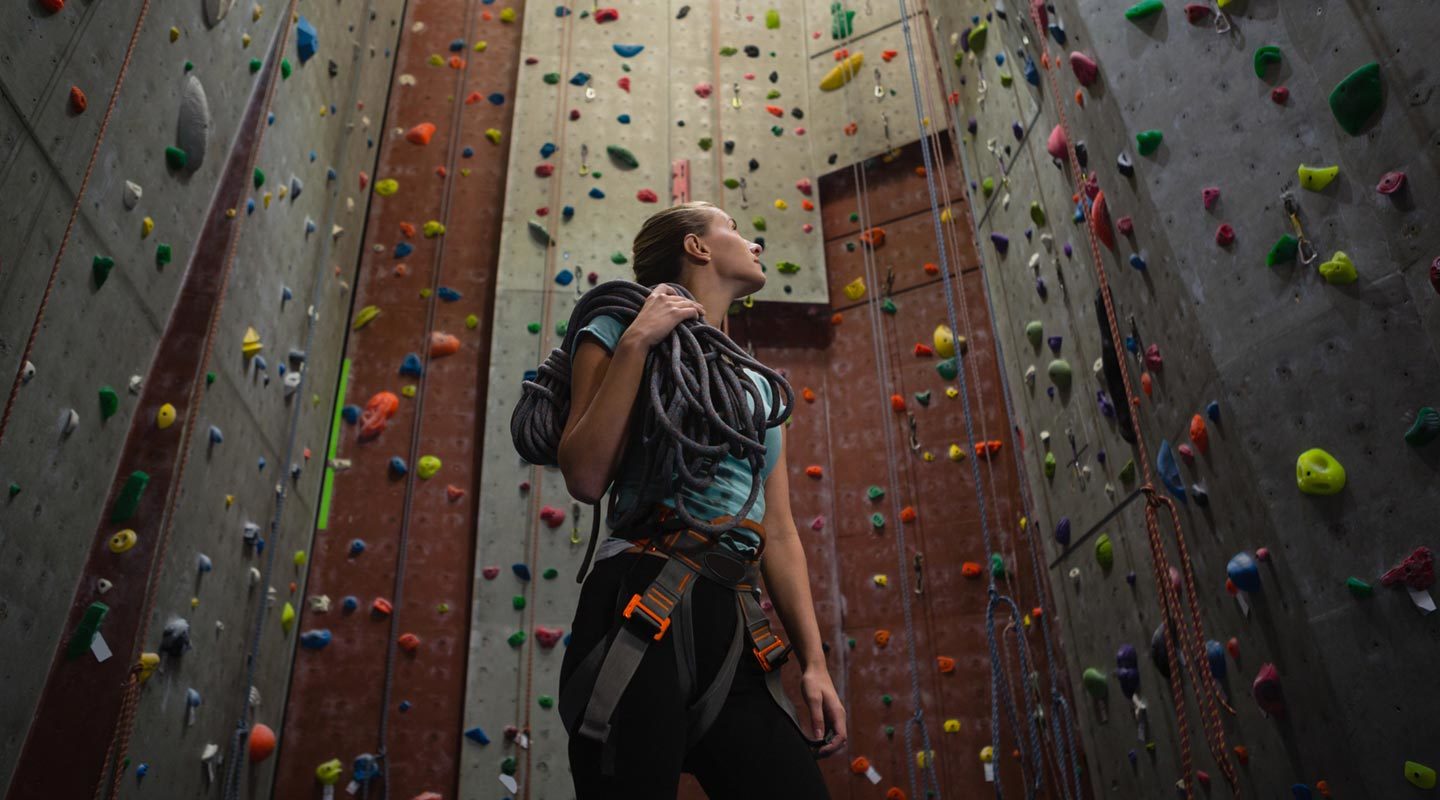Rock climbing is a popular activity due to its adrenaline rush and physical challenge. People enjoy the thrill of conquering heights and pushing their limits.
Rock climbing is a unique sport that requires strength, endurance, and mental agility. One must have full trust in their gear and climbing partner, while also maintaining a keen sense of self-awareness and focus. Furthermore, rock climbing provides an opportunity for people to connect with nature and disconnect from electronics and everyday stresses.
The sport can be done both indoors and outdoors, making it accessible to individuals of all skill levels. Overall, rock climbing attracts people who are seeking adventure, personal growth, and a sense of accomplishment.

Credit: sendedition.com
Understanding The Allure Of Rock Climbing
Rock climbing has become increasingly popular over the years, attracting a diverse group of people to the sport. From amateur enthusiasts to experienced climbers, the allure of the sport transcends gender, age, and cultural boundaries. But why do people like rock climbing?
Understanding the allure of rock climbing requires a closer look at the following key points.
Introduction To Rock Climbing As A Sport And Its Increasing Popularity
- Rock climbing as a sport has evolved over the last several decades, with variations such as indoor, bouldering, and outdoor climbing.
- In recent years, the popularity of the sport has grown significantly, with more indoor climbing facilities, outdoor climbing destinations, and media coverage.
- The physical and mental challenges offered by rock climbing, along with the sense of accomplishment and community, are some of the reasons why more people are drawn to it.
The Physical Challenge
- Rock climbing requires a high level of physical fitness, strength, and endurance.
- The sport can provide a full-body workout, including the upper body, core, and lower body muscles, while also developing balance and agility.
- Climbers often push themselves to their limit, increasing their strength and endurance over time, and experiencing a sense of accomplishment with each climb.
The Mental Challenge
- Successful climbers must possess mental strength, focus, and problem-solving skills.
- Climbers must analyze each climb, determining the safest and most efficient route while managing their fear and stress levels.
- The mental challenge of rock climbing can help individuals develop resilience, persistence, and a growth mindset, skills that can be applied to other areas of life.
Connection To Nature
- Many climbers are drawn to the sport for the opportunity to connect with nature.
- Outdoor climbing destinations offer breathtaking views and the opportunity to escape the hustle and bustle of city life.
- Climbing in nature can also provide a profound sense of satisfaction, as individuals navigate unfamiliar terrain, challenge themselves, and appreciate the beauty of the natural world.
Sense Of Accomplishment
- Climbing even a short distance can provide a sense of accomplishment and pride.
- Climbing increasingly more challenging routes can help climbers push their limits and achieve their goals.
- The sense of accomplishment of rock climbing can boost confidence, self-esteem, and personal growth.
Community And Social Connection
- Climbing is often done with a partner or a team, making it a social sport.
- Climbers often rely on each other for support and encouragement, building a sense of camaraderie and connection.
- The climbing community also offers opportunities for mentorship, coaching, and organizing events, building a supportive network of peers.
People are drawn to rock climbing for a variety of reasons, including the physical and mental challenges, connection to nature, sense of accomplishment, and social connection. As the popularity of the sport continues to grow, more individuals are discovering the transformative power of rock climbing.
The Physical Challenge Of Rock Climbing
Overcoming Physical Limitations And Pushing Oneself To The Limit
Rock climbing is a sport that requires immense physical strength and endurance. Climbers need to overcome their physical limitations and push themselves to the limit to conquer challenging routes. It is not just about ascending a wall or a rock face, but also about learning to control your body and maximize your physical potential.
Climbing has become popular in recent times due to its emphasis on strength and endurance.
The Physical Benefits Of Rock Climbing
Rock climbing is not only a great sport, but it also provides numerous physical benefits. Climbing is a full-body workout that targets your arms, legs, core, and back. It increases strength, flexibility, balance, and endurance. It also helps to improve coordination, agility, and stamina.
Regular climbing can strengthen muscles that may not be used in conventional workouts. It is a perfect physical activity for people who want to engage in a non-traditional workout that offers a multitude of benefits.
- Increased strength: Climbing involves a lot of pulling movements, which strengthens your arms, core, back, and leg muscles.
- Improved endurance: Climbing requires sustained energy throughout the climb and thus improves endurance over time, allowing you to push yourself even harder.
- Better balance: Climbing requires balance and stability, and regular practice can improve your balance and coordination.
Personal Anecdotes From Experienced Rock Climbers
Needless to say, overcoming physical challenges is an integral part of rock climbing. Experienced climbers often talk about the physical and mental challenges they have faced while climbing. Here are some personal anecdotes from the most experienced rock climbers:
- “climbing has taught me how to control my body and breath when i’m in the most challenging moments of a climb. It’s just as much mental as it is physical. “- alex honnold
- “climbing requires strength, flexibility, balance, and stability. When you finally make it to the top, it’s a feeling of pride and accomplishment that’s hard to describe. “- lynn hill
- “climbing has transformed my body more than any other sport i have done. It has helped me to develop my core strength, balance, and mental toughness. “- tommy caldwell
Rock climbing is an exhilarating sport that offers a multitude of physical benefits. Climbers need to push themselves beyond their physical limits to achieve success. Climbing is not just about physical strength but also controlling your mind and body. Whether you are a beginner or an experienced climber, rock climbing is a sport that can benefit your health and wellbeing.
The Mental Benefits Of Rock Climbing
Explore The Mental Benefits Of Rock Climbing, Including Improved Focus, Determination, And Confidence
Rock climbing is an exciting, adrenaline-pumping activity that offers plenty of physical benefits. However, the sport also offers significant mental benefits that individuals of all ages can benefit from.
- Improved focus: Rock climbing requires full attention and focus. Participants must be fully present in the moment, aware of their surroundings and movements, and quick to react to any challenges that arise. This intense concentration improves focus, which can be applied to other areas of life.
- Determination: Rock climbing is a challenging activity that requires a high level of determination. It is a great way to develop a “never give up” attitude in the face of obstacles, which can be carried over to other areas of life.
- Confidence: Successfully climbing a rock wall, no matter how high or low, can give a tremendous sense of accomplishment. This can boost self-confidence and help individuals feel empowered to tackle other challenges in their lives.
Provide Examples Of How Rock Climbing Can Help Individuals Overcome Fears And Improve Mental Health
Rock climbing is an incredibly organised and supervised sport that prioritises safety above all else. While it can be intimidating and scary, it can also be an excellent way to overcome fears and improve mental health in general.
- Facing fears: The challenges involved in rock climbing can be an excellent way to confront and overcome fears, such as heights, enclosed spaces, or falling. With the guidance and support of a qualified instructor, individuals can learn to manage their fears, which can help them in other areas of life.
- Mental health: Rock climbing can be a form of therapy for individuals struggling with stress, anxiety, or other mental health conditions. The sport demands that climbers be present, focused, and pay attention to their bodies and breathing, which can have a meditative effect similar to mindfulness meditation.
Discuss The Meditative Qualities Of Rock Climbing And How It Can Be A Form Of Mindfulness Meditation
Rock climbing can be a form of mindfulness meditation that allows individuals to connect to their bodies, the environment and experience a sense of flow.
- Mindfulness: The activity requires climbers to be in the present moment, paying attention to the feel of their bodies, movement, and the climbing wall itself. This mindfulness is a form of meditation that can be cathartic for individuals who struggle with stress or anxiety.
- Flow: Rock climbing also involves a sense of flow or “being in the zone.” Climbers can experience a sense of concentration and focus where time seems to slow down, and they are entirely immersed in the experience.
The Community And Camaraderie Of Rock Climbing
Highlight The Strong Sense Of Community And Support Within The Climbing Community
Rock climbing is more than just an individual sport. It’s a shared activity that creates a strong sense of community and support among climbers. Here are some reasons why rock climbers enjoy this tight-knit community:
- Climbing gyms and outdoor climbing spots are meeting places where people with a passion for climbing can connect and make new friends.
- The encouragement and support provided by fellow climbers help to push individuals out of their comfort zones and further their climbing skills.
- Climbing gear is expensive and can be confusing for beginners. However, the strong community of climbers means that gear can be borrowed or shared. This makes it easier for newcomers to try out the sport without having to make a large investment upfront.
- The climbing community has a culture of safety and support. Experienced climbers are always willing to offer advice and guidance to novices to ensure that they are safe when climbing.
Provide Examples Of How Rock Climbing Can Be A Social And Collaborative Activity
Rock climbing is an activity that can be done alone, but it is often more fun with a partner or group. Here are some reasons why rock climbers enjoy making it a social and collaborative activity:
- Climbing with a partner requires communication and trust. This helps build strong relationships and deepens existing ones.
- Bouldering competitions require climbers to work together to solve challenging problems. This fosters a spirit of collaboration and teamwork within the climbing community.
- Climbing routes often require multiple people to work together. One person may hold the rope and provide support, while the other person climbs. This shared experience helps to strengthen the bond between climbers.
Discuss The Shared Experience And Camaraderie That Comes From Climbing With A Partner Or Group
Rock climbing is a challenging sport that requires trust and communication between partners. This shared experience and camaraderie is one of the reasons why rock climbers love to climb with a partner or group. Here are some ways in which climbing together can make the experience more enjoyable:
- Climbing with a partner creates a strong bond that stems from the trust and communication required to climb safely. This bond can be long-lasting and creates a sense of camaraderie.
- Climbing with a group can be a fun and social activity. It’s an opportunity to connect with others who share a passion for rock climbing.
- Climbing with a partner or group can provide a boost of motivation and support. When one person struggles with a difficult route, their partner or group can offer encouragement and advice to help them succeed.
Frequently Asked Questions Of Why Do People Like Rock Climbing?
Why Do People Like Rock Climbing?
Rock climbing offers a unique physical and mental challenge that pushes people out of their comfort zone. It also allows them to connect with nature, build camaraderie with other climbers, and achieve a sense of accomplishment through reaching the top of a challenging climb.
What Are The Physical Benefits Of Rock Climbing?
Rock climbing is a full-body workout that engages the core, arms, back, and legs. It improves overall strength, endurance, flexibility, and balance. Additionally, it can burn a significant amount of calories and help improve cardiovascular health.
Is Rock Climbing Dangerous?
Rock climbing can be dangerous without proper training, equipment, and supervision. However, when done safely and with proper precautions, the risks can be minimized. Most climbing accidents occur due to human error or equipment failure.
Conclusion
Rock climbing is much more than just a physical activity; it’s a mental and emotional experience. It challenges people both physically and mentally, pushing them outside of their comfort zones and helping them grow as individuals. From the adrenaline rush of conquering a difficult climb to the sense of accomplishment when reaching the top, it’s easy to see why so many people are drawn to rock climbing.
Additionally, rock climbing can also provide a sense of community and support, with climbers encouraging each other to push themselves to their limits. The sport also offers opportunities to connect with nature and disconnect from the stress of daily life.
Overall, rock climbing provides a unique combination of physical, intellectual, and emotional challenges that keep people coming back for more. It’s no wonder why it has become such a popular and rewarding sport for people of all ages and backgrounds.




